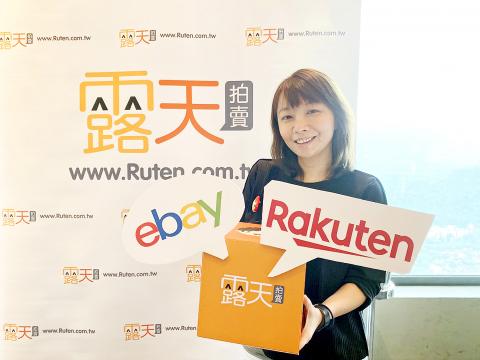Ruten.com (露天拍賣), a subsidiary of PChome Online Inc (網路家庭), yesterday said that it is to form a strategic alliance with US-based eBay Inc and Japan’s Rakuten Global Market to sell 70 million products during the Double 11 “shopping festival,” with the aim of selling more than NT$10 billion (US$327 million) of goods.
It is the first time that the company is collaborating with eBay and Rakuten by integrating their cross-border e-commerce platforms, Ruten chief operating officer Vicky Tseng (曾薰儀) said.
In the past, when e-commerce companies carried out cross-border e-commerce trades, sellers usually had to open stores or provide services on e-commerce platforms in other nations, and most sellers were required to prepare product illustrations in different languages and offer services to cater to cross-border e-commerce sales channels, Tseng said.

Photo: CNA
Ruten has discussed the possibility of using its research-and-development resources to improve site searches for products and services by using artificial-intelligence technology to help international sellers reduce their time to market, she said.
The number of items sold on Ruten’s site is about 420 million, and of the 70 million items introduced for the Double 11 shopping promotion this year, 60 percent would be from the US, 20 percent from the greater China region, and the rest mainly from Japan and South Korea, she said.
Transactions on Ruten’s online platform surpassed NT$8 billion during last year’s Double 11 festival, Tseng said.

Real estate agent and property developer JSL Construction & Development Co (愛山林) led the average compensation rankings among companies listed on the Taiwan Stock Exchange (TWSE) last year, while contract chipmaker Taiwan Semiconductor Manufacturing Co (TSMC, 台積電) finished 14th. JSL Construction paid its employees total average compensation of NT$4.78 million (US$159,701), down 13.5 percent from a year earlier, but still ahead of the most profitable listed tech giants, including TSMC, TWSE data showed. Last year, the average compensation (which includes salary, overtime, bonuses and allowances) paid by TSMC rose 21.6 percent to reach about NT$3.33 million, lifting its ranking by 10 notches

Popular vape brands such as Geek Bar might get more expensive in the US — if you can find them at all. Shipments of vapes from China to the US ground to a near halt last month from a year ago, official data showed, hit by US President Donald Trump’s tariffs and a crackdown on unauthorized e-cigarettes in the world’s biggest market for smoking alternatives. That includes Geek Bar, a brand of flavored vapes that is not authorized to sell in the US, but which had been widely available due to porous import controls. One retailer, who asked not to be named, because

SEASONAL WEAKNESS: The combined revenue of the top 10 foundries fell 5.4%, but rush orders and China’s subsidies partially offset slowing demand Taiwan Semiconductor Manufacturing Co (TSMC, 台積電) further solidified its dominance in the global wafer foundry business in the first quarter of this year, remaining far ahead of its closest rival, Samsung Electronics Co, TrendForce Corp (集邦科技) said yesterday. TSMC posted US$25.52 billion in sales in the January-to-March period, down 5 percent from the previous quarter, but its market share rose from 67.1 percent the previous quarter to 67.6 percent, TrendForce said in a report. While smartphone-related wafer shipments declined in the first quarter due to seasonal factors, solid demand for artificial intelligence (AI) and high-performance computing (HPC) devices and urgent TV-related orders

MINERAL DIPLOMACY: The Chinese commerce ministry said it approved applications for the export of rare earths in a move that could help ease US-China trade tensions Chinese Vice Premier He Lifeng (何立峰) is today to meet a US delegation for talks in the UK, Beijing announced on Saturday amid a fragile truce in the trade dispute between the two powers. He is to visit the UK from yesterday to Friday at the invitation of the British government, the Chinese Ministry of Foreign Affairs said in a statement. He and US representatives are to cochair the first meeting of the US-China economic and trade consultation mechanism, it said. US President Donald Trump on Friday announced that a new round of trade talks with China would start in London beginning today,